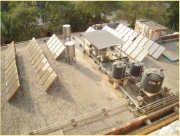/regions/india
India
The wealth of waste: The economics of wastewater use in agriculture - A report by FAO
Posted on 17 Dec, 2010 07:36 PM This report by the Food and Agriculture Organisation (FAO) deals with the economics of wastewater use in agriculture. It presents an economic framework for the assessment of the use of reclaimed water in agriculture, as part of a comprehensive planning process in water resource allocation strategies to provide for a more economically efficient and sustainable water utilization.
This report by the Food and Agriculture Organisation (FAO) deals with the economics of wastewater use in agriculture. It presents an economic framework for the assessment of the use of reclaimed water in agriculture, as part of a comprehensive planning process in water resource allocation strategies to provide for a more economically efficient and sustainable water utilization.
Water footprint assessments of dehydrated onion products of Jain Irrigation Systems Ltd – A report by IFC
Posted on 17 Dec, 2010 07:05 PMThis work on water footprint assessments represents a pioneering effort on documenting the water consumption in Jain Irrigation Systems Limited’s (JISL) production of dehydrated onions and of micro-irrigation systems. It also assesses the sustainability of this water consumption and formulate response strategies.
Development of an area based Energy Service Company (ESCO) model for solar water heating (SWH) in India
Posted on 17 Dec, 2010 08:05 AM This report for the Ministry of New and Renewable Energy (MNRE) deals with the development of an area based Energy Service Company (ESCO) model for solar water heating in India. Internationally, Solar Water Heating (SWH) has been identified as one of the most promising decentralized solar applications, having significant potential to reduce electricity consumption and consequent emissions reduction. Several schemes for promotion of solar water heaters have been in operation in the country.
This report for the Ministry of New and Renewable Energy (MNRE) deals with the development of an area based Energy Service Company (ESCO) model for solar water heating in India. Internationally, Solar Water Heating (SWH) has been identified as one of the most promising decentralized solar applications, having significant potential to reduce electricity consumption and consequent emissions reduction. Several schemes for promotion of solar water heaters have been in operation in the country.
National Rural Livelihoods Mission – Framework for implementation by Ministry of Rural Development
Posted on 16 Dec, 2010 07:46 PMThis document prepared by the Ministry of Rural Development (MoRD) presents the framework for implementation of National Rural Livelihoods Mission. The key challenge, in India is to ensure that the economic growth is inclusive and leads to significant reduction of rural poverty.
Drought 2009: Overview and management – A report by the Ministry of Agriculture
Posted on 16 Dec, 2010 09:39 AMThis document on the management of drought during 2009 published by the Department of Agriculture and Cooperation of the Ministry of Agriculture presents the deficiency and erratic behavior of rainfall, impact of drought, mitigation efforts initiated and their results. During the deficient and erratic rainfall of South-West monsoon 2009, fourteen States declared drought/ drought like situation/ scarcity in 338 districts of the country.
Water Jobs via DevNetJobsIndia.org dated December 15, 2010
Posted on 15 Dec, 2010 02:34 PMContent Courtesy: DevNetJobsIndia
- Project Engineer - Watershed Project
Nageshwara Charitable Trust, Centre for Women and Rural Development
Preparation of City Sanitation Plans for select cities in India - Consultation workshop organised by MoUD, MoEF and GTZ-ASEM (April 2010)
Posted on 14 Dec, 2010 09:37 PMA two day workshop was conducted on 15-16 April 2010 at Bangalore by GTZ-ASEM and supported by the Ministry of Urban Development (MoUD) and the Ministry of Environment and Forests (MoEF) regarding preparation of City Sanitation Plans.
The Ministry of Urban Development (MoUD) has undertaken the preparation of the City Sanitation Plans (CSPs) under the National Urban Sanitation Policy (NUSP) since the year 2008.
Groundwater quality in shallow aquifers of India – A report by the Central Ground Water Board
Posted on 14 Dec, 2010 07:54 AMThis report by the Central Ground Water Board entitled ‘Ground Water Quality in Shallow Aquifers of India’ is an outcome of the follow up of one of the important recommendations of the second meeting of the Advisory Council on Artificial Recharge to Ground Water during September 2007. It attempts to summarize various aspects of groundwater quality in the shallow aquifers in the country with special reference to six parameters viz. salinity, chloride, arsenic, fluoride, iron and nitrate.
Uniform protocol on water quality monitoring by Ministry of Environment and Forests (2005)
Posted on 13 Dec, 2010 07:32 PMThis deals with the Central Government’s order on “Uniform Protocol on Water Quality Monitoring Order” in June 2005 in exercise of the powers conferred by section 3 of the Environment (Protection) Act, 1986. Due to the deterioration of the river water quality, health and livelihood of the downstream people are being severely affected and concerns are raised time and again.
An introduction to sanitation technologies - Video from Water for People
Posted on 13 Dec, 2010 12:44 PMWe often get asked about toilets— what is the difference between a VIP and an improved pit latrine? What is the actual technology that supports Ecological Sanitation? Good questions, and so we are introducing short videos on different types of toilets.